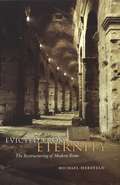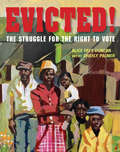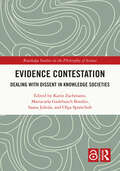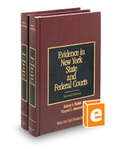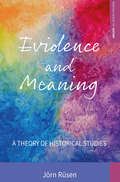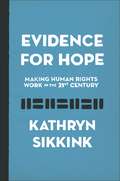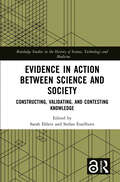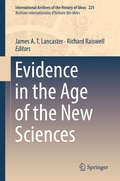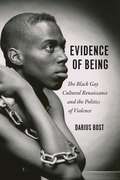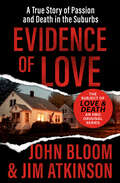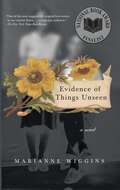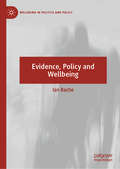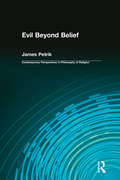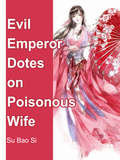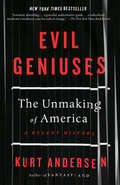- Table View
- List View
Evicted from Eternity: The Restructuring of Modern Rome
by Michael HerzfeldModern Rome is a city rife with contradictions. Once the seat of ancient glory, it is now often the object of national contempt. It plays a significant part on the world stage, but the concerns of its residents are often deeply parochial. And while they live in the seat of a world religion, Romans can be vehemently anticlerical. These tensions between the past and the present, the global and the local, make Rome fertile ground to study urban social life, the construction of the past, the role of religion in daily life, and how a capital city relates to the rest of the nation. Michael Herzfeld focuses on Rome's historic Monti district and the wrenching dislocation caused by rapid economical, political, and social change. Evicted from Eternity tells the story of the gentrification of Monti- once the architecturally stunning home of a community of artisans and shopkeepers now displaced by an invasion of rapacious real estate speculators, corrupt officials, dithering politicians, deceptive clerics, and shady thugs. As Herzfeld picks apart the messy story of Monti's transformation, he ranges widely over many aspects of life there and in the rest of the city, richly depicting the uniquely local landscape of globalization in Rome.
Evicted!: The Struggle for the Right to Vote
by Alice Faye DuncanThis critical civil rights book for middle-graders examines the little-known Tennessee's Fayette County Tent City Movement in the late 1950s and reveals what is possible when people unite and fight for the right to vote. Powerfully conveyed through interconnected stories and told through the eyes of a child, this book combines poetry, prose, and stunning illustrations to shine light on this forgotten history.The late 1950s was a turbulent time in Fayette County, Tennessee. Black and White children went to different schools. Jim Crow signs hung high. And while Black hands in Fayette were free to work in the nearby fields as sharecroppers, the same Black hands were barred from casting ballots in public elections. If they dared to vote, they faced threats of violence by the local Ku Klux Klan or White citizens. It wasn't until Black landowners organized registration drives to help Black citizens vote did change begin--but not without White farmers' attempts to prevent it. They violently evicted Black sharecroppers off their land, leaving families stranded and forced to live in tents. White shopkeepers blacklisted these families, refusing to sell them groceries, clothes, and other necessities. But the voiceless did finally speak, culminating in the Voting Rights Act of 1965, which legally ended voter discrimination. Perfect for young readers, teachers/librarians, and parents interested in books for kids with themes of: • Activism • Social justice • Civil rights • Black history
Evidence
by Lucy SanteFollowing Low Life, Lucy Sante's acclaimed evocation of the underside of New York City's history, Evidence is an investigation into the mysteries of crime, death, and photography that only this brilliant and original writer could conduct.In one sense Evidence is a picture book - a collection of 55 evidence photographs taken by the New York City Police Department between 1914 and 1918. These are startling images, some brutal, some poetic, and all possessed of a strange and spectral beauty.Lucy Sante minutely examines these pictures of crime scenes and draws them out by every possible means: speculating about the lives and deaths depicted; discussing the progress of the forensic use of photographs and the mission of photography itself; and, where possible, reconstructing the events that led up to these frozen terminal images. Evidence is many things at once: aesthetic object, historical and sociological document, mystery novel, memento mori, and time machine.
Evidence Contestation: Dealing with Dissent in Knowledge Societies (Routledge Studies in the Philosophy of Science)
by Mariacarla Gadebusch Bondio Karin Zachmann Saana Jukola Olga SparschuhThis book examines the practices of contesting evidence in democratically constituted knowledge societies. It provides a multifaceted view of the processes and conditions of evidence criticism and how they determine the dynamics of de- and re-stabilization of evidence. Evidence is an essential resource for establishing claims of validity, resolving conflicts, and legitimizing decisions. In recent times, however, evidence is being contested with increasing frequency. Such contestations vary in form and severity—from questioning the interpretation of data or the methodological soundness of studies to accusations of evidence fabrication. The contributors to this volume explore which actors, for what reasons and to what effect, question evidence in fields such as the biological, environmental, and health sciences. In addition to actors inside academia, they examine the roles of various other actors, including citizen scientists, counter-experts, journalists, patients, consumers, and activists. The contributors tackle questions of how disagreements are framed and how they are used to promote vested interests. By drawing on methodological and theoretical approaches from a wide range of fields, this book provides a much-needed perspective on how evidence criticism influences the development and state of knowledge societies and their political condition. Evidence Contestation will appeal to scholars and advanced students working in philosophy of science, epistemology, bioethics, science and technology studies, the history of science and technology, and science communication.
Evidence In New York State And Federal Courts (New York Practice Series #Second Edition, Volume 5)
by Robert A. Barker Vincent C. AlexanderEVIDENCE IN NEW YORK STATE AND FEDERAL COURTS SECOND EDITION Volume 5
Evidence In New York State And Federal Courts 2d (New York Practice Series #Volume 5A)
by Robert A. Barker Vincent C. AlexanderThis comprehensive publication on the law of evidence in New York includes a summary of corresponding law under the Federal Rules of Evidence (FRE). The authors synthesize and explain the complex mix of cases and statutes, while examining the purpose and requirements of the rules, together with discussion of leading cases. The title also includes New York's evidence statutes and the relevant FRE in their restyled format. Chapters cover general principles, judicial notice, burden of proof and presumptions, relevancy, privileges, witnesses, opinions and expert testimony, hearsay, authentication and identification, best evidence, and real and demonstrative evidence.
Evidence Not Seen: A Woman's Miraculous Faith in a Japanese Prison Camp During WWII
by Darlene Deibler RoseThis is the story of the author's life as a young missionary to New Guinea, and her subsequent capture and imprisonment in a Japanese prison camp.
Evidence and Faith
by Charles TaliaferroCharles Taliaferro has written a dynamic narrative history of philosophical reflection on religion from the seventeenth century to the present, with an emphasis on shifting views of faith and the nature of evidence. The book begins with the movement called Cambridge Platonism, which formed a bridge between the ancient and medieval worlds and early modern philosophy. While the book provides a general overview of different movements in philosophy, it also offers a detailed exposition and reflection on key arguments. The scope is broad, from Descartes to contemporary feminist philosophy of religion. Written with clarity and verve, this is a book that will appeal to professionals and students in the philosophy of religion, religious studies, and the history of ideas, as well as informed lay readers.
Evidence and Meaning: A Theory of Historical Studies (Making Sense of History #28)
by Jörn RüsenAs one of the premier historical thinkers of his generation, Jörn Rüsen has made enormous contributions to the methods and theoretical framework of history as it is practiced today. In Evidence and Meaning, Rüsen surveys the seismic changes that have shaped the historical profession over the last half-century, while offering a clear, economical account of his theory of history. To traditional historiography Rüsen brings theoretical insights from philosophy, narrative theory, cultural studies, and the social sciences, developing an intricate but robust model of "historical thinking" as both a cognitive discipline and a cultural practice-one that is susceptible neither to naïve empiricism nor radical relativism.
Evidence and the Archive: Ethics, Aesthetics and Emotion
by Trish Luker Katherine BiberThis collection explores the stakes, risks and opportunities invoked in opening and exploring law’s archive and re-examining law’s evidence. It draws together work exploring how evidence is used or mis-used during the legal process, and re-used after the law’s work has concluded by engaging with ethical, aesthetic or emotional dimensions of using law’s evidence. Within socio-legal discourse, the move towards ‘open justice’ has emerged concurrently with a much broader cultural sensibility, one that has been called the "archival turn" (Ann Laura Stoler), the "archival impulse" (Hal Foster) and "archive fever" (Jacques Derrida). Whilst these terms do not describe exactly the same phenomena, they collectively acknowledge the process by which we create a fetish of the stored document. The archive facilitates our material confrontation with history, historicity, order, linearity, time and bureaucracy. For lawyers, artists, journalists, publishers, curators and scholars, the document in the archive has the attributes of authenticity, contemporaneity, and the unique tangibility of a real moment captured in material form. These attributes form the basis for the strict interpretive limits imposed by the rules of evidence and procedure. These rules do not contain the other attributes of the archival document, those that make it irresistible as the basis for creative work: beauty, violence, surprise, shame, volume, and the promise that it contains a tantalising secret. This book was previously published as a special issue of Australian Feminist Law Journal.
Evidence for Hope: Making Human Rights Work in the 21st Century
by Kathryn SikkinkA history of the successes of the human rights movement and a case for why human rights workEvidence for Hope makes the case that, yes, human rights work. Critics may counter that the movement is in serious jeopardy or even a questionable byproduct of Western imperialism. They point out that Guantánamo is still open, the Arab Spring protests have been crushed, and governments are cracking down on NGOs everywhere. But respected human rights expert Kathryn Sikkink draws on decades of research and fieldwork to provide a rigorous rebuttal to pessimistic doubts about human rights laws and institutions. She demonstrates that change comes slowly and as the result of struggle, but in the long term, human rights movements have been vastly effective.Attacks on the human rights movement’s credibility are based on the faulty premise that human rights ideas emerged in North America and Europe and were imposed on developing southern nations. Starting in the 1940s, Latin American leaders and activists were actually early advocates for the international protection of human rights. Sikkink shows that activists and scholars disagree about the efficacy of human rights because they use different yardsticks to measure progress. Comparing the present to the past, she shows that genocide and violence against civilians have declined over time, while access to healthcare and education has increased dramatically. Cognitive and news biases contribute to pervasive cynicism, but Sikkink’s investigation into past and current trends indicates that human rights is not in its twilight. Instead, this is a period of vibrant activism that has made impressive improvements in human well-being.Exploring the strategies that have led to real humanitarian gains since the middle of the twentieth century, Evidence for Hope looks at how these essential advances can be supported and sustained for decades to come.
Evidence in Action between Science and Society: Constructing, Validating, and Contesting Knowledge (Routledge Studies in the History of Science, Technology and Medicine)
by Sarah EhlersThis volume is an interdisciplinary attempt to insert a broader, historically informed perspective into current political and academic debates on the issue of evidence and the reliability of scientific knowledge. The tensions between competing paradigms, different bodies of knowledge and the relative hierarchies between them are a crucial element of the historical and contemporary dynamics of scientific knowledge production. The negotiation of evidence is at the heart of this process. Starting from the premise that evidence constitutes a central, but also essentially contested concept in contemporary knowledge-based societies, this volume focuses on how evidence is generated and applied in practice—in other words, on “evidence in action.” The contributions analyze and compare different evidence practices within the field of science and technology, how they interlink with different forms of power, their interaction with and impact on the legal and political domain, and their relationship to other, more heterodox forms of evidence that challenge traditional notions of evidence. In doing so, this volume provides much-needed context and historical background to contemporary debates on the so-called “post-truth” society. Evidence in Action is the perfect resource for all those interested in the relationship between science, technology, and the role of knowledge in society.
Evidence in the Age of the New Sciences (International Archives of the History of Ideas Archives internationales d'histoire des idées #225)
by James A.T. Lancaster Richard RaiswellThe motto of the Royal Society—Nullius in verba—was intended to highlight the members’ rejection of received knowledge and the new place they afforded direct empirical evidence in their quest for genuine, useful knowledge about the world. But while many studies have raised questions about the construction, reception and authentication of knowledge, Evidence in the Age of the New Sciences is the first to examine the problem of evidence at this pivotal moment in European intellectual history. What constituted evidence—and for whom? Where might it be found? How should it be collected and organized? What is the relationship between evidence and proof? These are crucial questions, for what constitutes evidence determines how people interrogate the world and the kind of arguments they make about it.In this important new collection, Lancaster and Raiswell have assembled twelve studies that capture aspects of the debate over evidence in a variety of intellectual contexts. From law and theology to geography, medicine and experimental philosophy, the chapters highlight the great diversity of approaches to evidence-gathering that existed side by side in the sixteenth and seventeenth centuries. In this way, the volume makes an important addition to the literature on early science and knowledge formation, and will be of particular interest to scholars and advanced students in these fields.
Evidence of Being: The Black Gay Cultural Renaissance and the Politics of Violence
by Darius BostEvidence of Being opens on a grim scene: Washington DC’s gay black community in the 1980s, ravaged by AIDS, the crack epidemic, and a series of unsolved murders, seemingly abandoned by the government and mainstream culture. Yet in this darkest of moments, a new vision of community and hope managed to emerge. Darius Bost’s account of the media, poetry, and performance of this time and place reveals a stunning confluence of activism and the arts. In Washington and New York during the 1980s and ’90s, gay black men banded together, using creative expression as a tool to challenge the widespread views that marked them as unworthy of grief. They created art that enriched and reimagined their lives in the face of pain and neglect, while at the same time forging a path toward bold new modes of existence. At once a corrective to the predominantly white male accounts of the AIDS crisis and an openhearted depiction of the possibilities of black gay life, Evidence of Being above all insists on the primacy of community over loneliness, and hope over despair.
Evidence of Love: A True Story of Passion and Death in the Suburbs
by John Bloom Jim AtkinsonThe &“fascinating&” true story behind the HBO Max and Hulu series about Texas housewife Candy Montgomery and the bizarre murder that shocked a community (Los Angeles Times Book Review). Candy Montgomery and Betty Gore had a lot in common: They sang together in the Methodist church choir, their daughters were best friends, and their husbands had good jobs working for technology companies in the north Dallas suburbs known as Silicon Prairie. But beneath the placid surface of their seemingly perfect lives, both women simmered with unspoken frustrations and unanswered desires. On a hot summer day in 1980, the secret passions and jealousies that linked Candy and Betty exploded into murderous rage. What happened next is usually the stuff of fiction. But the bizarre and terrible act of violence that occurred in Betty&’s utility room that morning was all too real. Based on exclusive interviews with the Gore and Montgomery families, Edgar Award finalist Evidence of Love is the &“superbly written&” account of a gruesome tragedy and the trial that made national headlines when the defendant entered the most unexpected of pleas: not guilty by reason of self-defense (Fort Worth Star-Telegram). Adapted into the Emmy and Golden Globe Award–winning television movie A Killing in a Small Town—as well as the new limited series Candy on Hulu and Love and Death on HBO Max—this chilling tale of sin and savagery will &“fascinate true crime aficionados&” (Kirkus Reviews).
Evidence of Things Unseen: A Novel
by Marianne WigginsThis poetic novel, by the acclaimed author of John Dollar, describes America at the brink of the Atomic Age. In the years between the two world wars, the future held more promise than peril, but there was evidence of things unseen that would transfigure our unquestioned trust in a safe future.Fos has returned to Tennessee from the trenches of France. Intrigued with electricity, bioluminescence, and especially x-rays, he believes in science and the future of technology. On a trip to the Outer Banks to study the Perseid meteor shower, he falls in love with Opal, whose father is a glassblower who can spin color out of light.Fos brings his new wife back to Knoxville where he runs a photography studio with his former Army buddy Flash. A witty rogue and a staunch disbeliever in Prohibition, Flash brings tragedy to the couple when his appetite for pleasure runs up against both the law and the Ku Klux Klan. Fos and Opal are forced to move to Opal's mother's farm on the Clinch River, and soon they have a son, Lightfoot. But when the New Deal claims their farm for the TVA, Fos seeks work at the Oak Ridge Laboratory -- Site X in the government's race to build the bomb.And it is there, when Opal falls ill with radiation poisoning, that Fos's great faith in science deserts him. Their lives have traveled with touching inevitability from their innocence and fascination with "things that glow" to the new world of manmade suns.Hypnotic and powerful, Evidence of Things Unseen constructs a heartbreaking arc through twentieth-century American life and belief.
Evidence, Policy and Wellbeing (Wellbeing in Politics and Policy)
by Ian BacheThis book analyses the role of evidence in taking wellbeing from an issue that has government attention to one that leads to significant policy change. In doing so, it draws on contributions from political science, policy theory and literature specifically on the evidence and policy relationship. The book has three main aims: to understand the role of evidence in shaping the prospects for wellbeing in public policy; to inform the barriers literature on the use of evidence in policy; and, to inform the multiple streams approach (MSA) to agenda-setting. While the book focuses on developments at UK government level, a number of the findings and arguments presented here have wider significance, both in relation to wellbeing developments elsewhere and to the theoretical literatures on agenda-setting and evidence use. The book draws on insights from interviews with policy-makers and stakeholders that were undertaken as part of the work of the Community Wellbeing Evidence Programme of the What Works Centre for Wellbeing.
Evidentiality in Sa'dī's Poetry and Prose: A Corpus Stylistic Study (Iranian Studies)
by Behrooz Mahmoodi-Bakhtiari Masoumeh MehrabiThis study is the first to introduce evidentiality to the stylistic analysis of literary works, specifically that of the great Persian writer Sa'dī, focusing on how he used linguistic means to illustrate a real or ideational world. The authors begin by introducing the concept of evidentiality; its definition, its coding in Persian, the rationale behind evidentiality analysis, and semantic-pragmatic functions of evidentiality. The book highlights how evidentiality can be accounted for as a stylistic device to reveal the validity of a narration, as well as the author’s commitment and contribution to it. Three of Sa'dī’s major works are analyzed – Būstān, Golestān and Sonnets – using Krippendoff's frequency approach. It is argued that Sa'dī deployed an array of evidentials in his work, from direct visual evidentials in Golestān and Sonnets to heard and quoted evidentials in Būstān. To illustrate this, the book includes translations of Sa'dī’s poetry and prose. In addition, the authors consider historical and contemporary manifestations of the Persian narrative style, as well as exploring the cultural concerns of the Persian speech community. The book will appeal to general linguists, practitioners of pragmatics and stylistics, literary critics, and those interested in contrastive analysis of literature and cultural studies.
Evie Undercover
by Liz HarrisOn assignment in Italy, an undercover reporter gets up close and personal with a hotshot lawyer . . . When gossip reporter Evie Shaw is assigned to get dirt on libel lawyer Tom Hadleigh, she decides to go undercover as his dowdy new secretary. But Tom doesn’t need someone to bring him coffee—he needs an Italian translator to stay with him at his beautiful new home in Umbria. It’s the kind of access gossip reporters dream about, but the assignment has its challenges: Not only is Tom tight-lipped, he’s also irresistibly gorgeous. Though he never mixes business with pleasure, Tom’s iron will is slipping when it comes to his new secretary. Beneath those nondescript suits is a quick-witted beauty who excites him in ways he’s never experienced before. But as sparks start to fly under the Italian sun, will Evie get the scandalous story she needs, or will she have a sultry scandal of her own? “Chock full of fun, laughter, charm, [and] sexiness.” —Keeper Bookshelf
Evie's War: A charming and captivating wartime saga (Evie's Dartmoor Chronicles)
by Kitty DantonAfter discovering that her fiancé, Timmy, has been less than faithful, Evie is faced with a dilemma of the heart - she must try to mend their relationship or otherwise cut all ties and move on. Moving on from a first love is never easy though and it's further complicated by the fact that Timmy's mother is the headmistress at Evie's school and can't hear a bad word said against him.Luckily, Evie has two sisters and a close circle of friends to help her through the tough times and as the war brings British RAF officers and American GIs to the once quiet and calm village - as well as evacuees, Land Girls and wounded servicemen - life is going to be anything but dull.(p) 2016 Soundings
Evie's War: The gripping wartime saga you need to read this summer (Evie's Dartmoor Chronicles)
by Kitty DantonThe first in a new series of wartime sagas for fans of Maureen Lee, Katie Flynn and Dilly Court After finding out that her fiancé, Timmy, has been less than faithful, Evie is faced with a dilemma of the heart - she must try to mend their relationship or cut all ties and move on. But moving on from a first love is never easy and it's complicated by the fact that Timmy's mother is the headmistress at the school where Evie teaches and she won't hear a bad word said against him. Luckily, Evie has two sisters and a close circle of friends to help her through the tough times and as the war brings British RAF officers and American GIs to the once quiet and calm village - as well as evacuees, Land Girls and wounded servicemen - it seems that life is going to be anything but dull.Fans of Ellie Dean's Cliffehaven series will enjoy Evie's Dartmoor Chronicles series: 1. Evie's War2. Evie's Allies3. Evie's VictoryWhat readers are saying about Evie's War:'Evie is just the type of woman any one would love as a friend' Amazon Vine reviewer'I cannot wait for book two in the saga: Evie's Allies. A compelling read. I really enjoyed it.' Amazon reviewer'This novel both charms and surprises the readers' Amazon reviewer
Evil Beyond Belief
by James PetrikAn introduction to and overview of the entire problem of evil, from a philosophical perspective. The text aims to be introductory and inclusive, both by familiarizing students with the main contours of the intellectual terrain, and by pointing them in the direction of further resources.
Evil Emperor Dotes on Poisonous Wife: Volume 5 (Volume 5 #5)
by Su BaosiThe wrong person was thrown into the snake den miserably, almost to the point of not leaving behind a corpse. He wanted to see how she would turn her hand into the clouds, turn her hand into rain, return those who laughed at him, humiliate him, bully him, beat him, and slaughter him back! Everyone knew that he was a king that looked down upon the heavens. His killing skills were decisive and ruthless, yet he was like a ladle of weak water to her. Only she knew that this scheming prince was a big tail wolf who only knew how to crawl out of bed every day! Can you keep your distance? " A certain girl slammed the table and jumped up, gritting her teeth. When a certain prince heard this, he raised his eyebrows and forcefully approached, overturning his usual aloof and sexy voice: "I can't do it from a distance. How about, you try getting close with your husband?"
Evil Emperor Dotes on Poisonous Wife: Volume 6 (Volume 6 #6)
by Su BaosiThe wrong person was thrown into the snake den miserably, almost to the point of not leaving behind a corpse. He wanted to see how she would turn her hand into the clouds, turn her hand into rain, return those who laughed at him, humiliate him, bully him, beat him, and slaughter him back! Everyone knew that he was a king that looked down upon the heavens. His killing skills were decisive and ruthless, yet he was like a ladle of weak water to her. Only she knew that this scheming prince was a big tail wolf who only knew how to crawl out of bed every day! Can you keep your distance? " A certain girl slammed the table and jumped up, gritting her teeth. When a certain prince heard this, he raised his eyebrows and forcefully approached, overturning his usual aloof and sexy voice: "I can't do it from a distance. How about, you try getting close with your husband?"
Evil Geniuses: The Unmaking of America: A Recent History
by Kurt AndersenWhen did America give up on fairness? The New York Times bestselling author of Fantasyland tells the epic history of how America decided that big business gets whatever it wants, only the rich get richer, and nothing should ever change—and charts a way back to the future. <P><P>During the twentieth century, America managed to make its economic and social systems both more and more fair and more and more prosperous. A huge, secure, and contented middle class emerged. All boats rose together. But then the New Deal gave way to the Raw Deal. Beginning in the early 1970s, by means of a long war conceived of and executed by a confederacy of big business CEOs, the superrich, and right-wing zealots, the rules and norms that made the American middle class possible were undermined and dismantled. The clock was turned back on a century of economic progress, making greed good, workers powerless, and the market all-powerful while weaponizing nostalgia, lifting up an oligarchy that served only its own interests, and leaving the huge majority of Americans with dwindling economic prospects and hope. <P><P>Why and how did America take such a wrong turn? <P><P> In this deeply researched and brilliantly woven cultural, economic, and political chronicle, Kurt Andersen offers a fresh, provocative, and eye-opening history of America&’s undoing, naming names, showing receipts, and unsparingly assigning blame—to the radical right in economics and the law, the high priests of high finance, a complacent and complicit Establishment, and liberal “useful idiots,” among whom he includes himself. <P><P>Only a writer with Andersen’s crackling energy, deep insight, and ability to connect disparate dots and see complex systems with clarity could make such a book both intellectually formidable and vastly entertaining. And only a writer of Andersen&’s vision could reckon with our current high-stakes inflection point, and show the way out of this man-made disaster. <P><P><b>A New York Times Bestseller</b>
